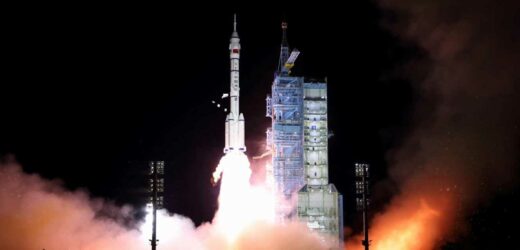CHINA’S round-the-world hypersonic nuclear weapon fired a second missile while travelling five times faster than the speed of sound, reports claim.
No country had previously been able to demonstrate this advanced engineering feat and the test is said to have caught Pentagon scientists off guard.
Last month China stunned the world when it emerged it launched a hypersonic missile right around the globe.
Now it has been revealed the weapon is far more advanced than originally thought.
The hypersonic glide vehicle, a manoeuvrable spacecraft which can carry a nuclear warhead, fired a separate missile during its flight in the atmosphere over the South China Sea on July 27, according to a Financial Times report.
Experts at the Pentagon’s advanced research agency Darpa are said to be unsure how China achieved the feat, as scientists say it "tests the constraints of physics".
Military experts are said to have been poring over the data to discover how it was achieved.
They are also said to be discussing what the projectile might be for.
It was fired by the hypersonic vehicle but seems to have had no obvious target, before it plunged into the water.
Some Pentagon experts believe the projectile was an air-to-air missile while others think it was a countermeasure to destroy missile defence systems so that they cannot shoot down the hypersonic weapon.
Both Russia and the US have been trying to develop hypersonic weapons for years, but experts have claimed the firing of the second missile is the latest evidence that China’s efforts are far more advanced than either the Kremlin or the Pentagon.
“This development is concerning to us as it should be to all who seek peace and stability in the region and beyond,” said a spokesperson for the National Security Council (NSC).
“This also builds on our concern about many military capabilities that the People’s Republic of China continues to pursue.”
The NSC added the US would “continue to maintain the capabilities to defend and deter against a range of threats” from China.
The hypersonic glide vehicle was propelled into space via an “orbital bombardment system” rocket which can fly over the South Pole, effectively putting it out of reach of US missile defence systems.
Russia used a “fractional orbital bombardment system” during the Cold War, but was less advanced and didn’t carry a manoeuvrable hypersonic glide vehicle.
Armed and dangerous: China’s defence spending
China has spent an extra £151billion in military spending this year – a 6.8 per cent increase – as it seeks to extend its claim over territory in the South China Sea.
Its defence spending comes amid fears of an arms race among Asian powers as the world heads towards a new Cold War.
Among its hypersonic missiles is the DF-26, which state media boasted can travel 18 times faster than the speed of sound.
It can travel far enough to blitz the US territory of Guam in the Pacific Ocean.
The rocket can carry conventional or nuclear warheads, and one variant is said to be able to take out carrier groups in the open ocean.
China also announced it's developing a hypersonic weapon designed to generate an intense electromagnetic pulse that would wipe out communication and power lines.
The missile, which has a range of 2,000miles and can travel at six times the speed of sound, is designed to create a chemical explosion over a city and cripple it within seconds.
The July 27 test indicated the People’s Liberation Army Rocket Force was making far faster progress than many had thought.
Those fears were reinforced by Beijing combining an orbital system with a hypersonic weapon that can fire a missile.
The test comes at a time when China is rapidly expanding its nuclear forces, indicating it is abandoning its “minimum deterrence” stance it has maintained for decades.
The US recently said it would quadruple its nuclear warhead by at least 1,000 weapons this decade.
The Chinese embassy said it was “not aware” of the missile test.
“We are not at all interested in having an arms race with other countries,” said Liu Pengyu, the embassy spokesperson. “The US has in recent years been fabricating excuses like ‘the China threat’ to justify its arms expansion and development of hypersonic weapons.”
Beijing dismissed the original hypersonic weapons test, claiming it was a test of a reusable space vehicle.
But that test of the space vehicle took place 11 days before the hypersonic weapons test, according to people familiar with both tests.
China is also thought to have carried out another hypersonic weapons test on August 13.
General David Thompson, vice-chief of space operations at the US Space Force, said the US was “not as advanced” as China or Russia in hypersonic weapons.
“We have catching up to do very quickly. The Chinese have had an incredibly aggressive hypersonic programme for several years,” Thompson told the Halifax International Security Forum on Saturday.
“Sputnik created a sense of urgency in the United States,” General John Hyten told CBS News. “The test on July 27 did not create that sense of urgency. I think it probably should create a sense of urgency.”
Earlier this year, the Russian military announced it had tested a hypersonic missile it claimed was capable of evading all Western defences.
The deadly Zircon was unleashed at a speed of Mach 7 at a land target from the frigate Admiral Gorshkov in the White Sea off the northwest coast of Russia.
The Zircon has been identified by Moscow’s state-controlled TV as Vladimir Putin’s weapon of choice to wipe out coastal American cities in the event of a nuclear conflict.
We pay for your stories!
Do you have a story for The Sun news desk?
Email us at [email protected] or call 0207 782 4104. You can WhatsApp us on 07423 720 250. We pay for videos too.
Click here to upload yours.
Click here to get The Sun newspaper delivered for FREE for the next six weeks.
Source: Read Full Article





